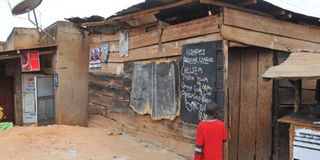Kibanda: The slum man’s cinema hall

A boy stands outside a Kibanda video hall. PHOTO BY FAISWAL KASIRYWE
What you need to know:
Different scripts, same story. An ordinary man in a slum has a place where he can watch a movie and enjoy the same satisfaction as the one who watches from the affluent cinema halls.
When one tells a Kenyan that he or she is going to a Kibanda, they may tag along, thinking you are off to a vegetable and fruit stall. The urban Ugandan, meanwhile, may either couple your idea with a long jeer, or wish you good luck in your voyage to moral drain.
A Kibanda is a roughly built structure with an open space under the roof which works as a cinema hall. Commonly located in most town suburbs all over the country, these are the immediate movie oriented centres any child would be introduced to because of their easy accessibility.
With house hold names like Vj Jjingo and Vj Junior, this entertainment business has witnessed a progressive growth that has seen many Ugandans investing in them.
Ssalongo Jjingo a.k.a Vj JJingo and proprietor of Kanjjansi Boys Videos says, “I used to watch movies with friends who had low education backgrounds and often teased them on whether they understood what the movies were about. Most did not understand the stories in the movies.” “I thought up the idea to translate the movies to allow the illiterate Ugandan to relate and understand what the movie is about,” he added.
With entrance fee of only Shs300 at K2 video hall, you will find over 80 people by 11 o’clock in the morning. Interestingly the main population being men of ages ranging from 15 to 35.
“I come here to relax early in the morning after a busy night, and then I go home and rest,” Richard Mukwasi, a chapatti seller says.
In this stuffy and dark room, people sat carelessly, some even watch with their chests bare. “There is no particular rule as long as you do not cause chaos,” Kirumira says. Like this particular cinema with three screens set at different angles showing the same movie, bibanda have upgraded from one screen to over three screens while others like Titanic video, hall Kajjansi will offer you large HD projection depending on the owners ambitions and wants.
“We give our customers as many views as we can afford to keep them attracted to the place but also let them watch the same movie in different angles if they like,” Kirumira chips.
After every movie, a man passes by collecting the fee from whoever wants to watch the next one. If you are not interested in watching the next movie, you are asked out.
Showing about eight movies a day one after the other, Kirumira explains that on a good day, he earns about two hundred thousand shillings from an audience of about 150 people.
“Better yet during the football season, we show all matches and on a weekend I can collect about Ushs500,000, after all the shown matches and movies,” he adds.
“We show movies throughout the day. From morning to about 4pm, we show action movies, between 4pm to 12pm we show love stories followed by erotic movies till 4am,” Kirumira says.
The clientel
“Our biggest crowd comes in between 9pm to 4am of which most are boys between 18 and 20 usually illiterate and addicted to watching movies,” he adds.
Unlike the known cinemas like Cineplex which follow age rates, bibanda rarely respect the rates set by the movie makers. For this reason it is assumed that they play a big role in moral degradation of children who frequent them.
While parents literary punish their children for going into a kibanda, Paul Kafero (no relation to the late artiste), the owner of Titanic video hall in Kajjansi says bibanda are just like any other cinema purely for entertainment.
“We write all the movies we are showing on the chalk boards expecting people to know what suits their age,” he adds.
He also argues that at the video halls you will not find a child below 16 inside.
Although these centres are labeled to be a haven for low class and idle people, middle class Ugandans will always have a tale of being in one or more kibandas.
Football fans can testify to this especially when time has beaten them to the wall and there is nowhere else they would watch a given football match.
What is a Kibanda?
The name Kibanda, according to Samuel Kasibante, a video jockey (VJ) came up because the structure of the ‘cinemas halls’ look like the roughly built charcoal stalls, from which the name was derived,” says.
Located in most trading centres, surrounded by chapatti and fast food stalls and retail shops, these video halls’ main attraction is the loud impended sound of either gunshots or car movements in the different movie scenes.
Popularised by translated movies they air, these video halls show a variety of movies from action, to love stories and adult rated movies.
According to Bibanda fanatics, Kajjansi, a small town along Entebbe road is assumed to be the mother of the Bibanda craze. Having emerged in the early 90’s, this business has not only made movie entertainment cheap but also improved the wellbeing of their owners.
Originally most of such video centres were wooden structures but have now evolved into permanent structures, built out of brick and motor. Bosco Kirumira, the proprietor of K2 Video Hall in Namugongo says such developments came to effect because of cases like theft, bad weather conditions and also to make the structures more attractive.




